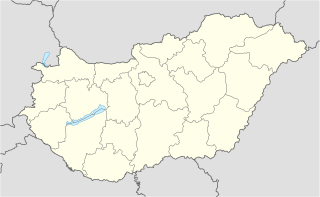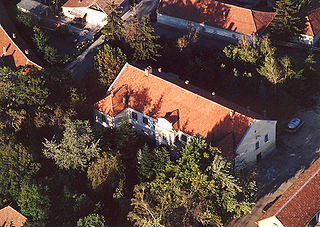
Central Europe is the central region of Europe. Central Europe includes contiguous territories that are sometimes also considered parts of Western Europe, Southern Europe and Eastern Europe. The concept of Central Europe is based on a common historical, social and cultural identity and is a patchwork of territories that are traditionally Catholic and Protestant. The Thirty Years' War between Catholicism and Protestantism was a significant shaping process in the history of Central Europe, and neither side was able to prevail in the region as a whole.

Hungary is a landlocked country in Central Europe. Spanning 93,030 square kilometres (35,920 sq mi) of the Carpathian Basin, it is bordered by Slovakia to the north, Ukraine to the northeast, Romania to the east and southeast, Serbia to the south, Croatia and Slovenia to the southwest, and Austria to the west. Hungary has a population of 10 million, mostly ethnic Hungarians and a significant Romani minority. Hungarian, the official language, is the world's most widely spoken Uralic language, and among the few non-Indo-European languages widely spoken in Europe. Budapest is the country's capital and largest city; other major urban areas include Debrecen, Szeged, Miskolc, Pécs, and Győr.

Hungary wields considerable influence in Central and Eastern Europe and is a middle power in international affairs. The foreign policy of Hungary is based on four basic commitments: to Atlantic co-operation, to European integration, to international development and to international law. The Hungarian economy is fairly open and relies strongly on international trade.

Budapest is the capital and the most populous city of Hungary, and the ninth-largest city in the European Union by population within city limits. The city has an estimated population of 1,752,286 over a land area of about 525 square kilometres. Budapest is both a city and county, and forms the centre of the Budapest metropolitan area, which has an area of 7,626 square kilometres and a population of 3,303,786, comprising 33% of the population of Hungary.

Fidesz – Hungarian Civic Alliance is a right-wing populist and national-conservative political party in Hungary.

The national football team represents Hungary in men's international football and is controlled by the Hungarian Football Federation. The team has made nine appearances in the FIFA World Cup finals and four appearances in the European Championship, and plays its home matches at the Puskás Aréna, which opened in November 2019.

Viktor Mihály Orbán is a Hungarian politician who has been Prime Minister of Hungary since 2010; he was also Prime Minister from 1998 to 2002. He has also been President of Fidesz, a national conservative political party, since 1993, with a brief break between 2000 and 2003. He supervises communications, long-term planning, daily operations, policy direction, and selection of candidates.

Szabolcs Huszti is a retired Hungarian footballer. He is well known for his dribbling, pace, passing and goal scoring ability from midfield.

Berente is a village in Borsod-Abaúj-Zemplén county, Hungary.

Halmaj is a village in Borsod-Abaúj-Zemplén county, Hungary. Before World War II, there was a Jewish community in Halmaj. At its height, there were 61 Jews in the community most of them were murdered by the Nazis in the Holocaust.

Taktaszada is a village in Borsod-Abaúj-Zemplén county, Hungary.

Tard is a village in Borsod-Abaúj-Zemplén county, Hungary.

Tolcsva is a village in Borsod-Abaúj-Zemplén county, Hungary. It is the birthplace of film pioneer William Fox.

Bánréve is a village in Borsod-Abaúj-Zemplén county, Hungary.

Bódvaszilas is a village in Borsod-Abaúj-Zemplén county, Hungary.

Szögliget is a village in Borsod-Abaúj-Zemplén County, Hungary.

Harsány is a village in Borsod-Abaúj-Zemplén County in northeastern Hungary.

Kissikátor is a village in Borsod-Abaúj-Zemplén County in northeastern Hungary.

Sajókaza is a village in Borsod-Abaúj-Zemplén County in northeastern Hungary.

The European migrant crisis, also known as the refugee crisis, is a period characterised by high numbers of people arriving in the European Union (EU) overseas from across the Mediterranean Sea or overland through Southeast Europe. In March 2019, the European Commission declared the migrant crisis to be at an end, although displaced people continued to arrive.




















